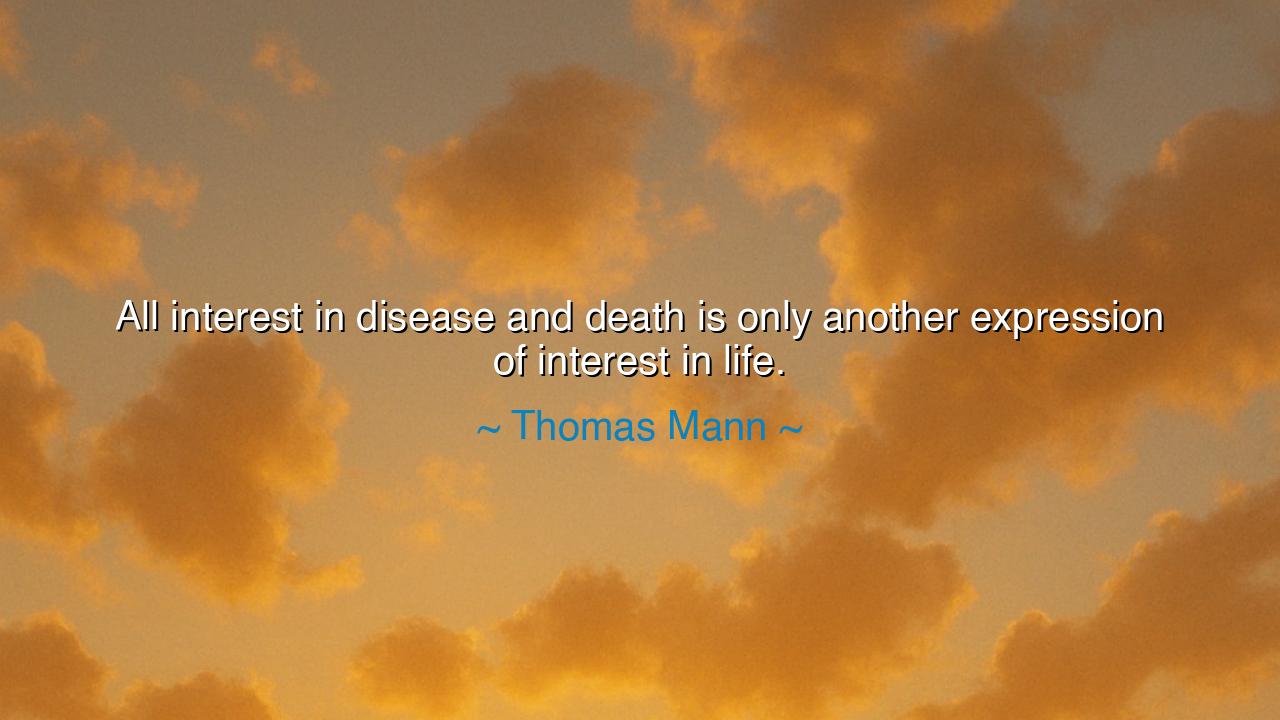
All interest in disease and death is only another expression of






In the profound words of Thomas Mann, the master chronicler of the human soul, we are reminded of a paradox that only the wise dare to utter: “All interest in disease and death is only another expression of interest in life.” To the unthinking, this may sound dark, as though fascination with suffering were a morbid pursuit. But Mann, whose pen often traced the fragile border between brilliance and decay, understood a deeper truth—that to look closely at death is not to reject life, but to understand it more completely. For within every inquiry into the end lies a reverence for the mystery of existence itself.
The ancients knew this well. In the temples of Egypt, the priests of Anubis tended to the mummified dead not in fear, but in devotion. Their work was a hymn to the continuity of being, a declaration that death and life are not opposites, but two halves of a single, eternal rhythm. So too, in the philosophy of Thomas Mann, the contemplation of decay is not nihilism—it is a form of awe. To study disease, to mourn, to ponder mortality—these are acts of reverence, for they mean we care enough about life to understand what threatens it, and what ultimately completes it.
In his great novel The Magic Mountain, Mann explored the quiet world of a sanatorium, where the ill lived suspended between healing and death. There, surrounded by sickness, his characters became philosophers of the human condition. Through them, Mann suggested that the awareness of mortality sharpens our appreciation for every breath. When man gazes upon suffering, he is forced to confront what is essential—to see beauty, love, and purpose with heightened clarity. Thus, the fascination with disease and death becomes not an obsession with endings, but an exaltation of the miracle that life persists at all.
History offers us the luminous example of Anton Chekhov, the Russian physician and writer who, even as he coughed his life away from tuberculosis, continued to write stories filled with tenderness for humanity. His medical eye saw the frailty of flesh; his artist’s heart saw the courage with which people endured. For Chekhov, as for Mann, to study illness was to study life stripped bare of illusion—its truth, its resilience, its humor. The dying body revealed the indomitable spirit that still longed to love, to laugh, to create. This is the very essence of Mann’s words: the fascination with the shadow springs only from the love of the light.
Disease and death, after all, are the mirrors of vitality. The physician’s labor, the philosopher’s reflection, the mourner’s tears—all arise from the same source: love for what is living, and fear of its loss. The scientist who studies cancer is no different in spirit from the poet who sings of the fleeting rose—they both recognize the transience of beauty, and through their work, affirm its worth. To deny death is to live shallowly; to face it, to learn from it, is to embrace life in its full, blazing truth. For only by confronting what ends can we cherish what endures.
Thomas Mann’s insight invites us, then, not to flee from darkness, but to look into it with courage. When you see suffering—whether in yourself or in others—do not turn away in disgust or despair. See instead the life that struggles within it, the will that refuses to surrender. When you contemplate death, do not see it merely as annihilation, but as the horizon that gives meaning to every dawn. The ancients called this memento mori—remember that you must die, not to dwell on sorrow, but to awaken gratitude for each moment you are given.
So, my child of tomorrow, take this teaching as your compass: do not fear to speak of pain, of loss, or of death. To love life truly, you must behold it in all its forms—the radiant and the ruined, the joyous and the mournful. When you see someone suffer, let your heart open wider, not close in fear. When you feel your own weakness, remember that it is proof you are still alive, still striving. And when the hour of your own ending draws near, may you meet it not as an enemy, but as the final chapter of a story well-lived.
For in the end, as Thomas Mann knew, our fascination with death is but the echo of our passion for life. We study the shadow only because we love the sun; we mourn the fallen only because we know the worth of standing tall. To understand death is to understand the sacredness of living—and that, above all, is the wisdom of the ages.






AAdministratorAdministrator
Welcome, honored guests. Please leave a comment, we will respond soon